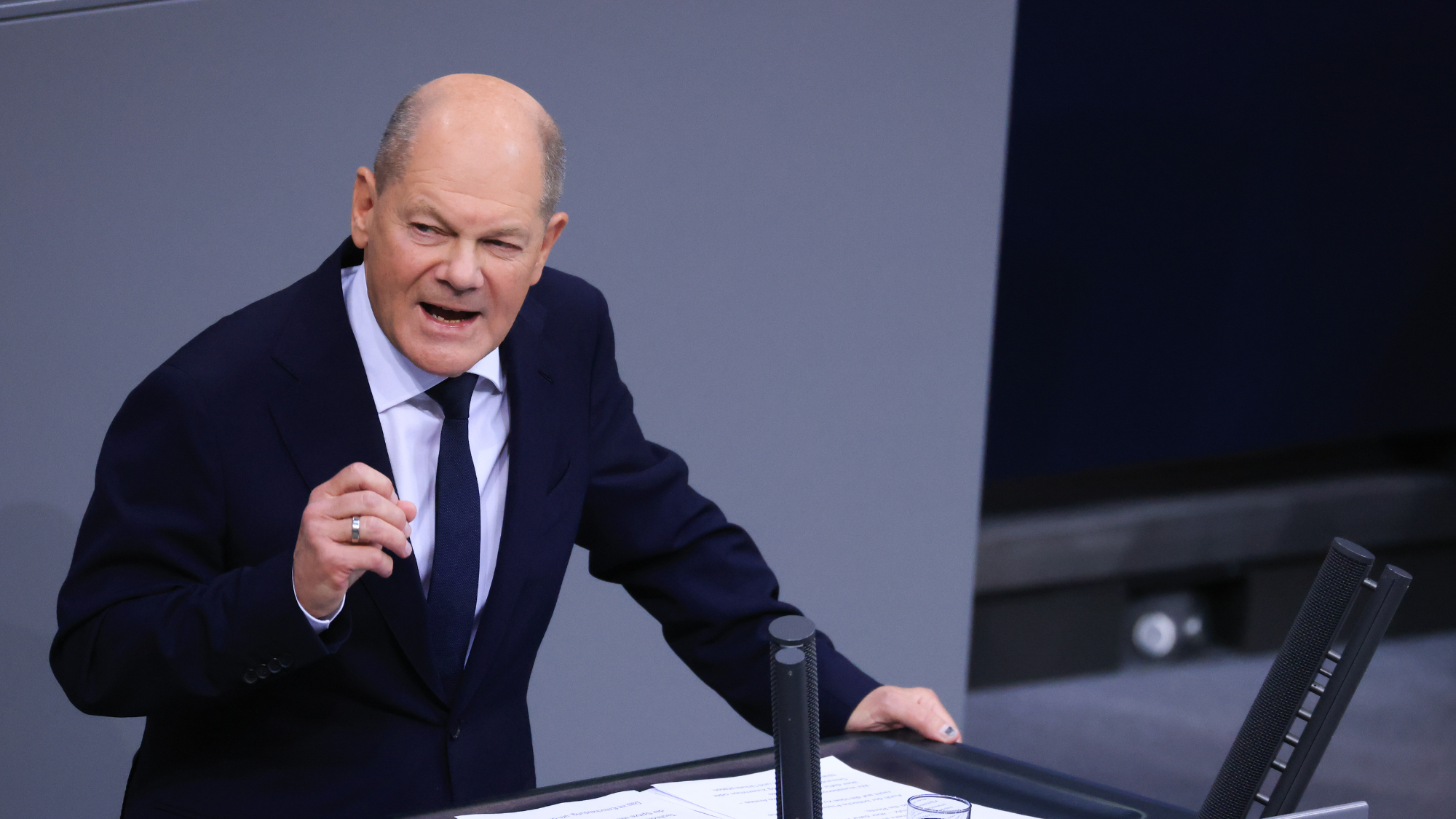Funeral in Berlin: Scholz pulls the plug on his coalition
In the midst of Germany's economic crisis, the 'traffic-light' coalition comes to a 'ignoble end'

A free daily email with the biggest news stories of the day – and the best features from TheWeek.com
You are now subscribed
Your newsletter sign-up was successful
As Europe digested the US election result last week, three leading figures of the German government were holding crisis talks in Berlin, said The Economist. But Chancellor Olaf Scholz, Vice-Chancellor Robert Habeck and the finance minister, Christian Lindner, weren't discussing how best to respond to Donald Trump's proposed tariffs or the likely US stance on Ukraine: "they were deciding whether to blow up their fraying coalition.
Barely 12 hours later, it was all over – and how." In a "blistering speech", Scholz eviscerated Lindner, who leads the pro-business Free Democrats (FDP), for his "incomprehensible egotism" and promptly fired him. The three parties that made up the "traffic-light" coalition that took office in 2021 – Scholz's Social Democrats (SPD), the FDP and the Greens – had lost patience with each other long ago, but this was the final blow. Scholz has brought "one of the most unpopular governments in modern German history" to an "ignoble end".
Not before time, said Jan Schäfer in Bild (Berlin). Far from tackling Germany's major problems, from its stagnant economy to its failing asylum policies, the coalition "led the country into an even deeper mess" with its meddling and infighting. To be fair, the origins of the economic mess should be traced to the failure of former chancellor Angela Merkel, said Wolfgang Münchau in The Times: it was she who allowed the economy to become over-reliant on a few industries like cars and chemicals; dependent on Russia for gas; dependent on China for exports. It was she who allowed Germany to fall far behind in digital tech; it now has one of Europe's worst mobile phone networks, and many shops "still only accept cash".
The Week
Escape your echo chamber. Get the facts behind the news, plus analysis from multiple perspectives.

Sign up for The Week's Free Newsletters
From our morning news briefing to a weekly Good News Newsletter, get the best of The Week delivered directly to your inbox.
From our morning news briefing to a weekly Good News Newsletter, get the best of The Week delivered directly to your inbox.
The economic crisis may be of long standing, said Alexander Marguier in Cicero (Berlin), but Scholz is to blame for "the deepest political crisis since the founding of the Federal Republic". He tried to force Lindner to suspend the constitutional rules that limit the size of Germany's deficit in order to facilitate help for Ukraine, knowing Lindner wouldn't agree: then he sacked Lindner when he baulked. Scholz's lame-duck minority government will now have to soldier on until snap elections, called for early 2025.
And each of the coalition parties is likely to come a cropper in these elections, said Nette Nöstlinger on Politico (Brussels): Scholz's SPD is polling at a miserable 16%; the FDP and Greens are doing even worse. All three face growing challenges from both the hard-left populist Sahra Wagenknecht Alliance, and the far-right AfD. But it's Friedrich Merz, of the centre-right Christian Democrats (CDU), who's likely to be Germany's next chancellor, said Josef Kelnberger in Süddeutsche Zeitung (Munich). We can only hope he will rid the country of its new reputation as the "sick man of Europe", and offer real leadership at a time when the EU confronts the prospect of a second Trump presidency and a surge in support for the far-right.
A free daily email with the biggest news stories of the day – and the best features from TheWeek.com
-
 Why is the Trump administration talking about ‘Western civilization’?
Why is the Trump administration talking about ‘Western civilization’?Talking Points Rubio says Europe, US bonded by religion and ancestry
-
 Quentin Deranque: a student’s death energizes the French far right
Quentin Deranque: a student’s death energizes the French far rightIN THE SPOTLIGHT Reactions to the violent killing of an ultraconservative activist offer a glimpse at the culture wars roiling France ahead of next year’s elections
-
 Secured vs. unsecured loans: how do they differ and which is better?
Secured vs. unsecured loans: how do they differ and which is better?the explainer They are distinguished by the level of risk and the inclusion of collateral
-
 Corruption: The spy sheikh and the president
Corruption: The spy sheikh and the presidentFeature Trump is at the center of another scandal
-
 Putin’s shadow war
Putin’s shadow warFeature The Kremlin is waging a campaign of sabotage and subversion against Ukraine’s allies in the West
-
 The fall of the generals: China’s military purge
The fall of the generals: China’s military purgeIn the Spotlight Xi Jinping’s extraordinary removal of senior general proves that no-one is safe from anti-corruption drive that has investigated millions
-
 Syria’s Kurds: abandoned by their US ally
Syria’s Kurds: abandoned by their US allyTalking Point Ahmed al-Sharaa’s lightning offensive against Syrian Kurdistan belies his promise to respect the country’s ethnic minorities
-
 Iran unleashes carnage on its own people
Iran unleashes carnage on its own peopleFeature Demonstrations began in late December as an economic protest
-
 How oil tankers have been weaponised
How oil tankers have been weaponisedThe Explainer The seizure of a Russian tanker in the Atlantic last week has drawn attention to the country’s clandestine shipping network
-
 The rise of the spymaster: a ‘tectonic shift’ in Ukraine’s politics
The rise of the spymaster: a ‘tectonic shift’ in Ukraine’s politicsIn the Spotlight President Zelenskyy’s new chief of staff, former head of military intelligence Kyrylo Budanov, is widely viewed as a potential successor
-
 Iran in flames: will the regime be toppled?
Iran in flames: will the regime be toppled?In Depth The moral case for removing the ayatollahs is clear, but what a post-regime Iran would look like is anything but